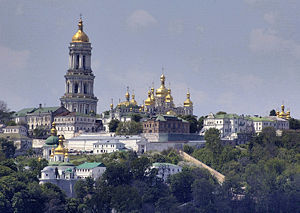Ukrainian Orthodox Church (Moscow Patriarchate)
|
||||||||||||||||||||||||
The Ukrainian Orthodox Church (Ukrainian: Українська Православна Церква; Russian: Украинская Православная Церковь) is an autonomous Church of Eastern Orthodoxy in Ukraine, under the ecclesiastic jurisdiction of the Moscow Patriarchate. Because of this it is often referred to as the Ukrainian Orthodox Church (Moscow Patriarchate) (Ukrainian: Українська Православна Церква (Московського Патріархату); Russian: Украинская Православная Церковь (Московского Патриархата)) and is one of the major Orthodox Churches in Ukraine, although it is the only one whose canonical status is recognized by the whole Eastern Orthodox communion.
Contents |
History
Formerly being the Ukrainian exarchate of the Russian Orthodox Church it received a full autonomy (a status one step short of full autocephaly) on October 27, 1990. The Ukrainian Orthodox Church considers the descendant of the Orthodox Church of Kiev and all Rus' in Ukraine, claiming a direct lineage to the original Baptism of Rus' by St. Vladimir (Volodymyr) in 988. The Metropolitan Volodymyr (Viktor Sabodan) is enthroned since 1992 as the head of the UOC under the title Metropolitan of Kiev and all Ukraine, the with the official residency in the Kiev Pechersk Lavra, which also contains all of the Church's apparatus.
The church is currently the only Ukrainian church to have canonical standing in Eastern Orthodoxy, and operates in full communion with the other Eastern Orthodox Churches. It also owns the majority of Orthodox church buildings in Ukraine and is predominant in eastern, central and southern Ukraine.
As of 2006 the Ukrainian Orthodox Church had the allegiance of 10,875 registered religious communities in Ukraine (approximately 68 percent of all Orthodox Christian communities in the country), located mostly in central, eastern and southern regions and is the largest religious body in Ukraine. However, this claim is contested by the Ukrainian Orthodox Church - Kiev Patriarchate. Officially UOC claims to have up to 35 million followers . The UOC (MP) officially regards other Orthodox churches of Ukraine to be "schismatic nationalist organizations" whose claims to represent Orthodoxy are canonically invalid, which is hotly contested by other other churches.
The Church currently has 42 dioceses, with 58 bishops (diocesan - 42; vicar - 12; retired - 4; with them being classified as: metropolitans - 10; archbishops - 21; or bishops - 26). There is also 8516 priests, and 443 deacons.[1]
Name
The Ukrainian Orthodox Church (MP) insists on its name being just the Ukrainian Orthodox Church,[2] stating that it is the sole canonic body of Orthodox Christians in the country,[2] a Ukrainian "local church" (Ukrainian: Помісна Церква), a claim fiercely contested by her non-canonic rivals. It is also the name that it is registered under in the State Committee of Ukraine in Religious Affairs.[3]
In mass media and in academic literature it is often referred to, as the Ukrainian Orthodox Church (Moscow Patriarchate) or UOC (MP)[4][5][6] in order to distinguish between the two rival churches contesting the name of the Ukrainian Orthodox Church.
Criticism
In 2008, a Russian Orthodox church in Ukraine was accused of fomenting anti-Semitic and anti-Ukrainian propaganda in Kamianets-Podilskyi through leaflets accusing Jews of being behind the masterminds of 1917 Russian Revolution and of 2004 Orange Revolution and also questioning the right of Ukraine to exist as a separate nation-state from Russia.[7]
See also
- History of Christianity in Ukraine
- Ukrainian Orthodox Church - Kiev Patriarchate
- Ukrainian Autocephalous Orthodox Church
References
- ↑ "Statistical data" (in Ukrainian). Ukrainian Orthodox Church. Retrieved on 2008-01-12.
- ↑ 2.0 2.1 The interview given by Metropolitan Volodymyr (Viktor Sabodan) to Associated Press
- ↑ "On the state and tendencies of expansion of the religious situation in government-church relations in Ukraine" (in Ukrainian). State Committee of Ukraine in Religious Affairs. Retrieved on 2008-01-12.
- ↑ "Politics and Society in Ukraine" (in English). Paul J. D'Anieri, Robert S. Kravchuk, Taras Kuzio. Retrieved on 2008-10-24.
- ↑ "Post-Soviet Political Order" (in English). Barnett R. Rubin, Jack L. Snyder. Retrieved on 2008-10-24.
- ↑ "The Orthodox Church in the History of Russia" (in English). Dimitry Pospielovsky. Retrieved on 2008-10-24.
- ↑ Orthodox Church Spreads Antisemitic Propaganda in Kamenets-Podolsky, Ukraine, Union of Councils for Jews in the Former Soviet Union, September 2, 2008
External links
- "orthodox.org.ua" (in English). Ukrainian Orthodox Church. Retrieved on 2008-01-12.
- "Official site of the Ukrainian Orthodox Church" (in Russian). Ukrayina Pravoslavna. Retrieved on 2008-01-12.
| Autocephalous and Autonomous Churches of Eastern Orthodoxy |
| Autocephalous Churches |
| Four Ancient Patriarchates: Constantinople | Alexandria | Antioch | Jerusalem Russia | Serbia | Romania | Bulgaria | Georgia Cyprus | Greece | Poland | Albania | Czech Republic and Slovakia | America* |
| Autonomous Churches |
| Sinai* | Finland | Estonia* | Japan* | China* | Ukraine | Western Europe* | Bessarabia* | Moldova* | Ohrid* | ROCOR** |
| The * designates a church whose autocephaly or autonomy is not universally recognized. The ** designates a semi-autonomous part of the Russian Orthodox Church. |
|
|||||||||||
